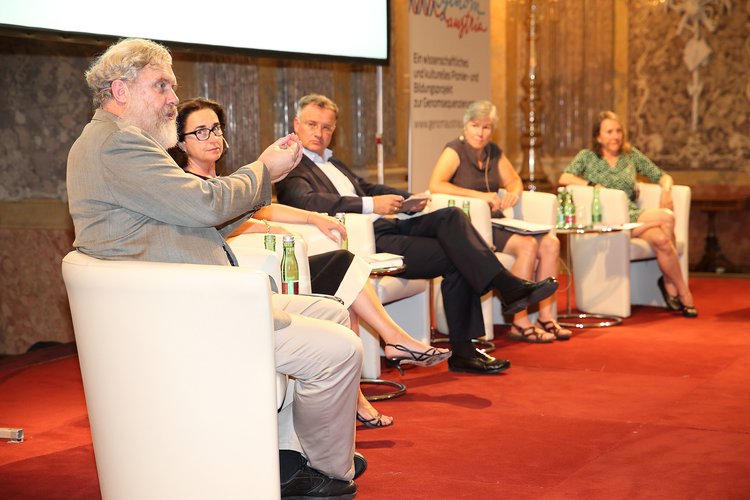Festive Lecture by George Church
Share
How new genomic technologies will impact us all
On 17 September 2015 a festive lecture held by geneticist George Church (Harvard Medical School) marked the beginning the GET Global Conference, hosted by CeMM in the context of Genom Austria. Celebrating the 10th anniversary of the Personal Genome Project, the conference brought together pioneers of personal genome sequencing and open science, discussing technological advances and associated ethical and societal aspects.
George Church is one of the inventors of genome sequencing and an advocate of open science. He based his talk entitled How new genomic technologies will impact us all on five questions: 1. Is human genetics useful today? 2. Getting new causes & cures? Organoids? 3. Genetically modified humans? 4. The most common disease? 5. Why share? George Church highlighted how genomic tests have changed medicine in the last decades. He also explained his view on genetically modified (micro-)organisms (GMOs), namely that they were widely accepted for producing life-saving drugs because there they would add a lot of value. In contrast, he argued that GMOs were highly controversial for food production because this is an area where they would not provide any major advantages that would outweigh the risks. He also raised the provocative question of genetically modified humans and highlighted that he currently sees no argument to support germline editing (which creates heritable changes in the genome), whereas he highlighted the clinical successes of somatic gene therapy in treating some of the most devastating rare diseases. The lecture concluded with his arguments why sharing genetic information can be beneficial for science and for society as a whole.
The lecture was followed by a panel discussion, with George Church, Christiane Druml (Vice-rector of the Medical University of Vienna and chairwoman of the Austrian Bioethics Commission), Markus Müller (newly appointed rector of the Medical University of Vienna) and Sharon Terry (President and CEO of GeneticAlliance.org), moderated by Esther Dyson (entrepreneur and investor). The lively discussion of the experts was enriched by interesting questions and comments by the audience, which included pioneers of the Personal Genome Project and also people who had never thought about having their genome analyzed before coming to this lecture.
The event was organized by Genom Austria, which is the Austrian member of the Global Network of Personal Genome Projects and the first such project in continental Europe. Genom Austria explores the scientific, educational, ethical, and social implications of personal genome sequencing. It aims to create an Austrian dataset of openly available human genomes donated by volunteers, thus breaking the ice and initiating a conversation about the opportunities and risks of an important technology.

